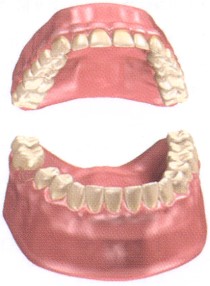
A tooth which is very decayed or
damaged, or loose because of gum
disease, may have to be extracted
(taken out of your mouth).
Wisdom teeth sometimes have to be
extracted if they have come through
at an awkward angle and are
causing problems (such as decay in
adjacent teeth or, being difficult to
clean, and causing infections).
Teeth are sometimes taken out from
children's mouths to help other teeth which are crowded to
grow straight, (usually on the advice of an orthodontist).
Some teeth are easier to take out than others. A local
anaesthetic (an injection in your mouth) will be used to numb
the tooth before it is extracted; this is the best treatment for
most patients.
In some cases, for children or nervous patients, or where a
tooth might prove difficult to remove, sedation (something to
make you relaxed) with a local anaesthetic may be used.
On rare occasions a general anaesthetic may be considered.
If a general anaesthetic is needed, you will have to go to a
hospital or a specialist treatment centre (you are likely to be
able to go home the same day, but not all patients are able
to do so).
After working out the best way to take the tooth out, your
dentist will discuss with you:
You may hear some noise and feel some pressure as the
tooth is being eased out - but you should not feel pain.
Sometimes stitches are put into the gum to minimise any post
extraction bleeding, to make the area more comfortable and
help it heal quickly.
Afterwards:
You may need a day or so off work to recover, depending on
how difficult the extraction was and whether sedation or a
general anaesthetic was used. Most people experience very
little post-operation discomfort. The dentist will ensure that
bleeding has stopped before you leave the practice. You should
not smoke or drink for at least 24 hours after an extraction.
The dentist will give you advice on:
© Stalybridge Dental Care 2009 - 2024
Last updated: 28 November 2023